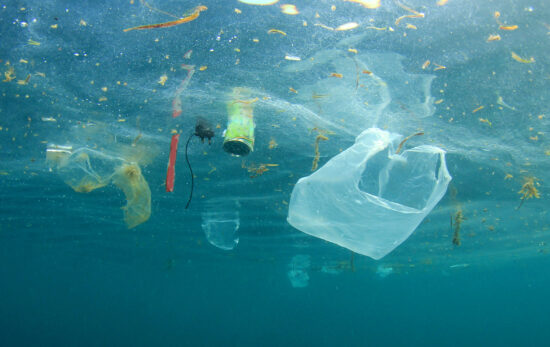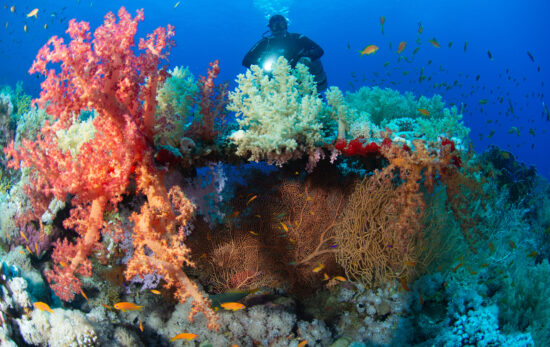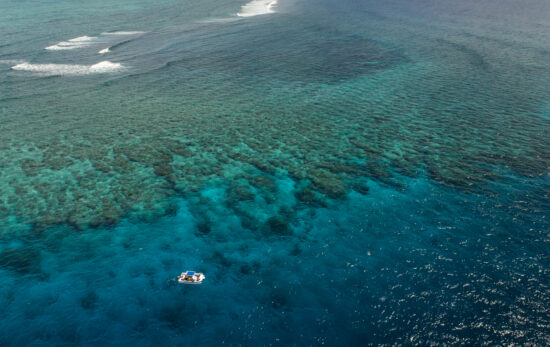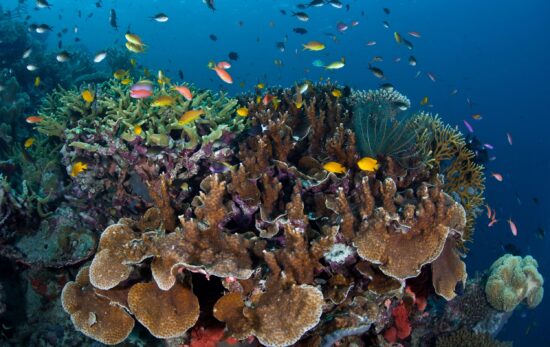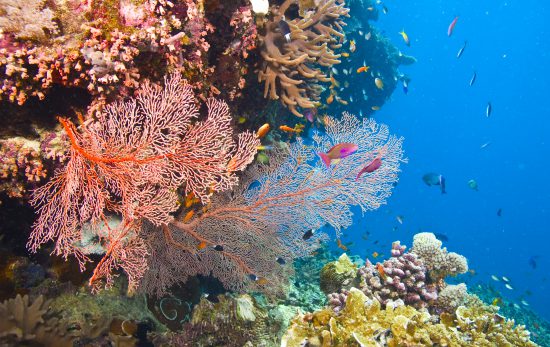The PADI AWARE Community Grant Program provides direct funding to local marine conservation projects that advance PADI’s Blueprint for Ocean Action.
To recognize International Women’s Day (8th March), here are some highlights of the amazing PADI Dive Leaders around the world taking action to restore coral reefs. Concurrently while building community resilience and defending marine protected areas.
Restoring 10,000 Square Meters of Degraded Reef at Confetti Bay, Coin de Mire Island in Mauritius
Rose Lowe from Dodo Divers Ltd., Mauritius
Located in the Indian Ocean, on the eastern side of Madagascar, is an island nation, Mauritius. Like most archipelagos, Mauritius depends on its coral reefs as a main source of income. Fishermen, dive shops, boat operators and restaurants scattered across the island tie their livelihoods to the health of the reefs. Therefore, community awareness and participation is a key factor in determining the success of any coral reef restoration project in Mauritius.
Rose Lowe, who runs such a program with Dodo Divers Ltd, understands this and has decided to use the funds provided to her project from the PADI AWARE Community Grant Program to, “expand [their] community engagement activities including free workshops for youth groups about our conservation work including our coral restoration and farming projects.”

And, while “an increase in local awareness regarding the importance of coral systems especially to island nations” would mean success for Lowe’s project, her main focus is on building a healthier reef in Confetti Bay, near Mauritius’ Coin de Mire Island. This, of course, excites local and global divers as Confetti Bay happens to be one of the area’s most popular dive sites. If her project is successful in restoring this ‘magical’ part of the ocean, Lowe hopes to expand her efforts to other sites throughout the country.
Surveying Fish Species and Abundance in the Shark Reef Marine Reserve
Natasha Marosi, Beqa Adventure Divers, Fiji
Fiji may be home to some of the best shark diving in the world, but that doesn’t mean their reefs aren’t facing jeopardy. In particular, pandemic poaching, when enforcement of fishing regulations was lax, degraded biodiversity around the island nation.
Yet, Natasha Marosi, Director of Conservation at Beqa Adventure Divers in Fiji, still describes the ocean as “Magical, Wonderous,” but adds the additional qualifiers of “Vulnerable, Finite” as well. This is why Marosi and her team have begun the arduous task of rehabilitating the Shark Reef Marine Reserve.
Their project will focus on surveying fish species within the reserve, with an emphasis on the grouper, jack, parrotfish, surgeonfish, emperor fish and snapper populations. Through biodiversity assessments and fish counts, they hope to quantify exactly how damaging pandemic poaching was in the area.

But, there’s always hope. The team emphasize that they will also be running follow-up surveys to determine whether there has been “a rapid rebound of many depleted fish species.” According to Marosi, any indication of an increase in biodiversity between surveys would be a key indicator of the success of local MPA regulations.
“It would give us hope that biodiversity could be restored, and Shark Reef Marine Reserve could once again be a sanctuary not only for sharks but [for] every creature calling the reef ecosystem ‘home,’” she noted.
Providing Coral Conservation Scholarships to Indonesian Women to Kickstart Careers in Marine Conservation
Rose Huizenga, Gili Shark Project, Indonesia
While many marine conservation projects focus on the here and now, Gili Shark Conservation in Indonesia is working to make a generational change in order to support its local coral reefs and women on the Gili Islands.
Thus far, Gili Shark Conservation has provided 100 Indonesian women with coral restoration scholarships in order to help them follow their dreams of working in marine conservation. These scholarships are part of their Coral Catch project.
The founder and director of the project, Rose Huizenga, notes, “Our ultimate goal is to create a community of women that are united in advocating for healthy oceans and that are working together to restore the reefs in Indonesia.”
Huizenga explains, “The ocean is the place that I call home, a place that inspires me every day to be the best version of myself; a place that I love to share with others, and with all who live there; [a place] to explore and learn and grow.”
This life philosophy led this woman in marine conservation to propose the Coral Catch project. When asked what the success of the project would look like, Huizenga remarked that she hopes to offer 20 Indonesian women a year-long coral conservation scholarship. She continued, “To give someone the opportunity to realize their dream is the most fantastic feeling in the world. It takes courage, passion, and dedication to follow your dreams and get off the beaten track to become a Coral Catch Superwoman. We are praising them on a daily basis for being kick-ass role models, and we are sure they will inspire many others to protect the blue heart of our planet.”
Building a Coral Nursery, Transplanting 1000 Coral Fragments onto Mahahual Reef, and Testing for Genetic Diversity in Mexico
Cassiopea Carrier Doneys, Takata Research Center, Mexico
Over in Mexico, Cassiopea Carrier Donys with Takata Research Center is heading up a full-scale reef restoration project. The team at Takata use science and years of experience to guarantee the highest success rate for coral fragments.
Donys and the team are using PADI AWARE funding to tick off three big goals. First, according to Donys, “This fund will enable us to transplant an additional 1000 coral fragments on the reef. Moreover, thanks to this fund, we can carry out genetic analysis to ensure genetic diversity on our restored reef.”
For coral restoration, genetic diversity plays an important role in creating a reef with greater tolerance for higher pollution levels, warmer water temperatures, acidification and other future maladies. In general, a rich mix of genotypes and species of corals makes for a reef with better resiliency.
Finally, the funds will also help Donys and her team to design another coral nursery, creating more restoration opportunities over a greater land mass.
But what does success look like for this project? The team will measure their goals based on the percentage of coral transplant survival. They also hope to see an increase in reef biodiversity and increased participation from the local community in reef restoration activities.
Donys adds, “Through the hard work of our scientists and volunteers, we hope to bring Mahahual back to one of the healthiest and most pristine reefs in the Caribbean Sea,” she added. “With this project, we wish to be an example and show other communities that it is possible to actively protect and restore our coastal ecosystems and that we can do it if we work all together.”
Female divers around the world are taking action to restore coral reefs, build community affinity for the oceans and defend marine protected areas. Thanks to their dedication, the oceans are a cleaner, safer and healthier place for everyone.
Want to help? Consider donating to the PADI AWARE Community Grant Program to help us fund similar marine conservation projects around the world.

